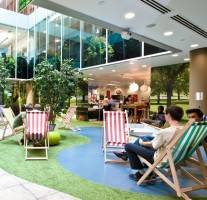September 28, 2015
A review of the CIFF office design show 2015 in Shanghai 0
 Shanghai’s population is reported to be in the region of twenty six million, more than double that of London, and the city continues to creep outwards inexorably, attracting even greater numbers. For the casual visitor however, its vast size does somehow seem to be manageable, just. The traffic is very heavy of course, but it does move, albeit slowly. There are few commercial vehicles on the city’s roads during the day and, in an effort to control the rampant pollution, almost all of the private cars and scooters are either electric or hybrids. This means that there is an eerie near-silence from the massive volume of traffic, interrupted only by the occasional police siren or outbreak of hooting from an impatient motorist. After dark, on poorly-lit streets, pedestrians are at real risk of getting run over by the silent cars or scooters that rarely use their lights – an economy measure?
Shanghai’s population is reported to be in the region of twenty six million, more than double that of London, and the city continues to creep outwards inexorably, attracting even greater numbers. For the casual visitor however, its vast size does somehow seem to be manageable, just. The traffic is very heavy of course, but it does move, albeit slowly. There are few commercial vehicles on the city’s roads during the day and, in an effort to control the rampant pollution, almost all of the private cars and scooters are either electric or hybrids. This means that there is an eerie near-silence from the massive volume of traffic, interrupted only by the occasional police siren or outbreak of hooting from an impatient motorist. After dark, on poorly-lit streets, pedestrians are at real risk of getting run over by the silent cars or scooters that rarely use their lights – an economy measure?

































October 12, 2015
How workplace design is more closely reflecting how we actually work 0
by Adrian Campbell • Comment, Flexible working, Workplace design
(more…)